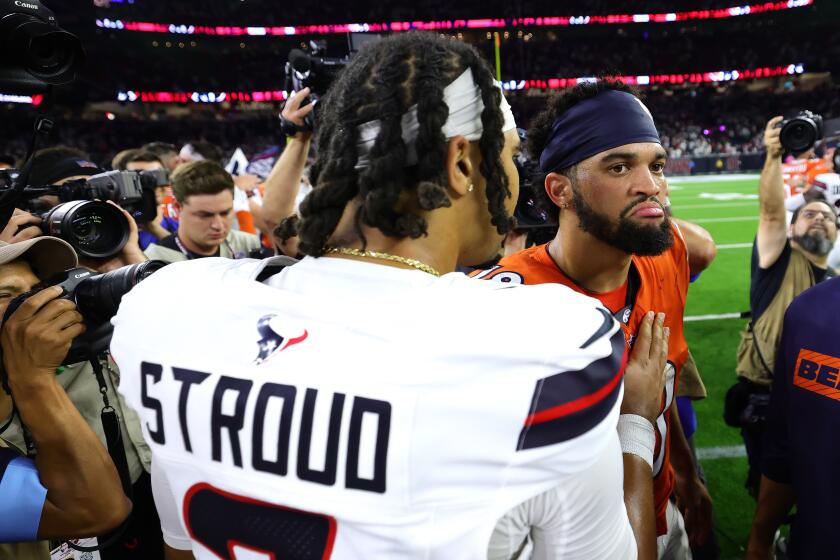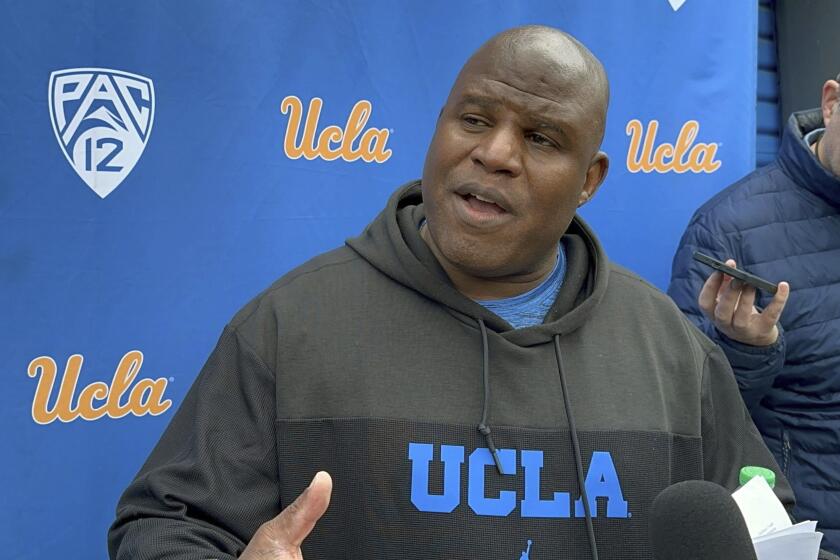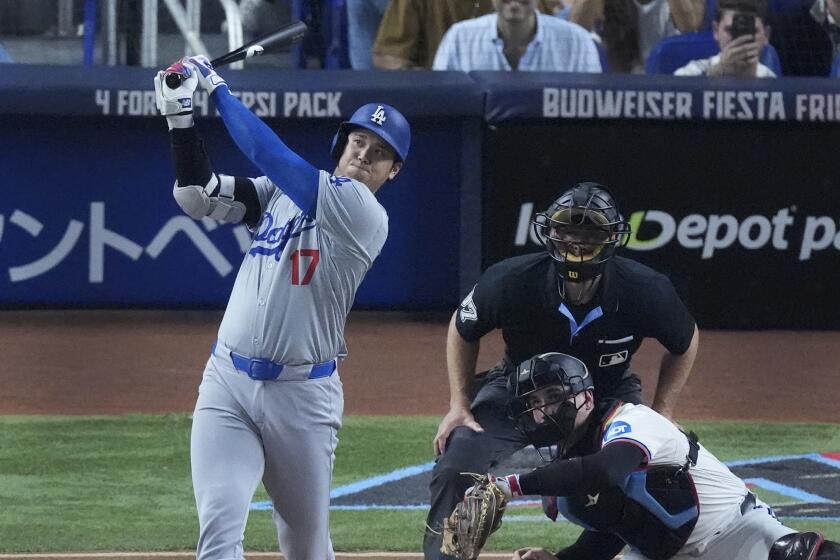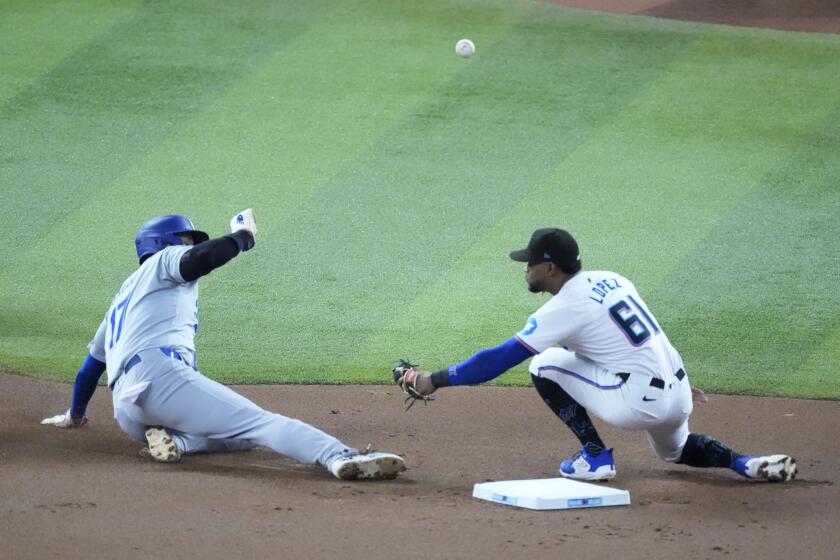NFL bans Vick for his role in dogfighting
For now, Michael Vick is a former NFL star.
The Atlanta Falcons quarterback admitted in court papers filed Friday that he financed an illegal dogfighting operation, participated in the killing of poorly performing pit bulls, and funded gambling on the fights.
And within hours, he was suspended indefinitely from the league without pay.
In a letter to Vick released to the media, NFL Commissioner Roger Goodell said, “Your admitted conduct was not only illegal, but also cruel and reprehensible. Your team, the NFL and NFL fans have all been hurt by your actions.”
Vick, 27, filed a plea agreement in federal court in Richmond, Va. He is expected to formally enter his plea Monday before U.S. District Judge Henry E. Hudson.
In the agreement, the government committed to recommending a prison term on the low end of the federal sentencing guideline of 12 to 18 months. The judge is not bound by any recommendation or by the sentencing guidelines.
The issue of whether Vick participated in illegal gambling was especially relevant to his future in the NFL.
In his plea, Vick admitted to conspiracy in financing Bad Newz Kennels -- run out of a property he owns in Surry County, Va. -- and to providing money that was gambled. His statement said that when the kennel’s dogs won, the gambling proceeds were generally shared by co-defendants Tony Taylor, Purnell Peace and Quanis Phillips, each of whom had agreed to testify against Vick as part of their own plea agreements.
“Vick did not gamble by placing side bets on any of the fights,” the summary said. “Vick did not receive any of the proceeds of the purses that were won by Bad Newz Kennels.”
But the NFL didn’t provide one of its marquee players any wiggle room when it came to its definition of gambling. That Vick provided the money being illegally wagered was a violation of his Falcons contract, Goodell said.
“Your plea agreement and the plea agreements of your co- defendants also demonstrate your significant involvement in illegal gambling,” the commissioner wrote. “Even if you personally did not place bets, as you contend, your actions in funding the betting and your association with illegal gambling both violate the terms of your NFL player contract and expose you to corrupting influences in derogation of one of the most fundamental responsibilities of an NFL player.”
Rich McKay, Falcons president and general manager, met with Goodell in New York before the league’s announcement. Later, team owner Arthur Blank endorsed the actions of the commissioner and strongly condemned Vick’s conduct.
“His admissions describe actions that are incomprehensible and unacceptable for a member of the National Football League and the Atlanta Falcons,” Blank said in a statement released by the team.
With his guilty plea, Vick “is taking full responsibility for his actions and the actions of the others involved,” his attorneys said in a statement. “Mr. Vick apologizes for his poor judgment in associating himself with those involved in dogfighting and realizes he should have never been involved in this conduct.”
The NFL had been conducting its own investigation of Vick, who was kept out of training camp pending the league’s review. The league had said it would let legal proceedings play out before determining its course of action.
Goodell added in his letter that, as part of reviewing Vick’s case, “I will take into account a number of factors, including the resolution of any other charges that may be brought against you, whether in Surry County, Va., or other jurisdictions; your conduct going forward; the specifics of the sentence imposed by Judge Hudson; and any related findings he might make; and the extent to which you are truthful and cooperative with law enforcement and league staff who are investigating these matters.”
The government will be “very aggressive” in trying to collect more information, said Frederick W. “Fritz” Chockley, a Washington, D.C.-based partner at Baker Hostetler and a prominent litigator in Northern Virginia.
“Presumably he’s agreed to cooperate with them, and if they can show in some way that he has not cooperated with them, then they can revoke a plea agreement,” Chockley said. “So they’ve got a lot of leverage with him to get him to talk.”
Investigators will ask Vick to identify other participants in dogfighting, the attorney predicted, adding, “Whether those are other NFL players or other individuals, those are the people that prosecutors are going to want to identify through Vick. If Vick’s role is financing, then he’s the one who’s likely to know who’s involved in financing on the other side of the transaction.”
In addition to federal sentencing, Vick may face charges by Virginia prosecutors, which could lead to an even longer prison term.
According to the July 17 indictment, Vick and the three others began purchasing pit bull puppies in 2001 -- after the former Virginia Tech star was selected No. 1 in the NFL draft -- and would eventually sponsor those dogs in fights. The purses ranged from hundreds of dollars to as much as $26,000.
The documents say the co- defendants also participated in the killing of dogs that failed to perform well in fights or testing sessions. The methods of execution included hanging, drowning, electrocution, shooting and slamming dogs’ bodies to the ground. In an earlier raid on the property, investigators seized about 60 dogs, most of them pit bulls, along with various devices used in fighting.
The NFL has suspended prominent players for gambling before. Green Bay Packers running back Paul Hornung, the NFL’s most valuable player in 1961, was forced to sit out the 1963 season along with Detroit Lions All-Pro defensive tackle Alex Karras after both admitted to betting on NFL games.
Vick has not been accused of gambling on NFL games, but neither was Art Schlichter, then quarterback of the Baltimore Colts, who was suspended in 1983 by the NFL when it was discovered he had $150,000 in gambling debts. He later went to jail for fraud and forgery.
Also, former commissioner Pete Rozelle forced New York Jets star Joe Namath to give up his Bachelors III nightclub because of alleged patronage by gamblers.
Vick, who was once among the NFL’s most marketable and highest-paid players, had annual earnings in excess of $20 million. But since the allegations of dogfighting arose, he was dropped by endorsers such as Nike, Rawlings Sporting Goods and Upper Deck trading cards.
Animal-rights groups applauded the NFL’s swift action in suspending Vick. Wayne Pacelle, president and chief executive of the Humane Society of the United States, called Vick “a role model for something terrible, and it’s not appropriate that he suit up in an NFL uniform.”
--
(BEGIN TEXT OF INFOBOX)
Michael Vick
Age: 27
Personal: Single, father of two
Hometown: Newport News, Va.
College: Virginia Tech. Led the Hokies football team to a 20-1 record over two seasons.
NFL: In 2001 became the first African American quarterback selected No. 1 overall in the league draft. A three-time Pro Bowl selection. Last season became the first quarterback in league history to run for more than 1,000 yards.
Atlanta Falcons: Signed a 10-year, $130-million contract in 2004; has earned more than $61 million in salary over six seasons.
Source: Los Angeles Times
More to Read
Go beyond the scoreboard
Get the latest on L.A.'s teams in the daily Sports Report newsletter.
You may occasionally receive promotional content from the Los Angeles Times.











